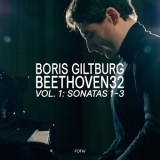Dies ist das erste digitale Album aus Boris Giltburgs Beethoven32-Projekt, das mit den nachfolgenden zu einer physischen Gesamtedition der Sonaten auf CD führen wird.
Als Motto scheint Boris Giltburg (laut seinem die Edition begleitenden Video-Projekt im Internet (https://beethoven32.com) folgendes festgehalten zu haben: « Beethovens Kernaussage ist das Leben. Er hat fraglos die Verzweiflung gekannt, wie anhand seiner Schriften und einiger seiner Kompositionen offenbar wird. Aber immer wieder rang er mit ihr, besiegte sie und kehrte mit unaufhaltsamer Lebensenergie zurück. »
Die drei ersten, wenngleich sehr unterschiedlichen Sonaten spielt Giltburg expressiver als beispielweise der viel objektiver vorgehende Michael Korstick, der für mich noch immer einer der maßgebenden Beethoven-Interpreten ist. Giltburg lässt keinen Zweifel daran, dass diese Sonaten schon Meisterwerke sind und gestaltet sie sehr rhetorisch. Insbesondere das Finale der ersten Sonate besticht durch seine zielgerichtete Interpretation, die den Satz stark differenziert, in seiner ganzen Vielfalt spannend macht und uns ahnen lässt, welchen Eindruck der Komponist damit in Wien machen wollte.
Das einleitende rhythmisch sehr aparte Allegro der A-Dur-Sonate klingt hier nicht so keck wie bei Korstick, aber bedeutsamer, vielleicht sogar anspruchsvoller. Ein tiefschürfend ausgelotetes Largo führt zum viel Charme versprühenden Scherzo, das aber sehr schön auch seine nachdenklichen Seiten zeigt. Leichtfertigkeit ist definitiv nicht Giltburgs Ding. Das kontrastreich musizierte Finale beendet diese sehr beeindruckende Interpretation.
Die virtuose dritte Sonate unterstreicht die Stellung, die Beethoven der Klaviersonaten in seinem Werk beimaß und die gewissermaßen auch als Prototypen für andere Werke zu sehen sind. Die Sonate weist wohl klar auf das Klavierkonzert hin, einer Gattung, an der Beethoven in jener Zeit bereits arbeitete.
Die wichtigsten Qualitäten von Giltburgs Spiel sind, den ersten drei Sonaten nach zu urteilen, die Diversität des Ausdrucks, die genau kontrollierten dynamischen Effekte und die größtmögliche Klarheit des Diskurses. Es ist jedenfalls ein mehr als vielsprechender Auftakt zu einer Gesamtaufnahme, auf deren restlichen 29 Sonaten man sehr gespannt sein darf.
























